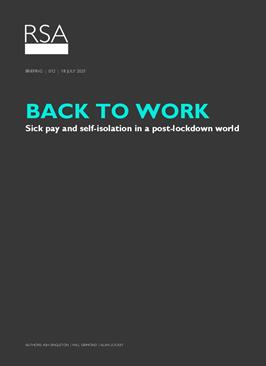19 July means a return to work for millions in England, as government safety measures are lifted.
Despite new freedoms to travel, work and socialise, those testing positive for coronavirus will continue to be required to isolate. This necessary sacrifice could still have potentially devastating financial consequences for many.
As part of our ongoing programme of working into economic security, we asked the public about the issues that they are likely to face when returning to work, and what would help them achieve economic security and meaningful employment in a post-lockdown world.
Our key findings
- Another wave of coronavirus would push a quarter of workers over the edge financially – with those in insecure work the least able to weather another wave.
- Voters of both Labour and Conservative parties support introducing the real living wage across the board, and for paying workers more to isolate.
- 42 percent of young people are feeling the pressure to go back to work, even with symptoms of coronavirus.
- Just 22 percent of Conservative voters said that they would be able to survive on statutory sick pay, and one-in-three fear they’ll be pressured into work with symptoms of the virus. Yet overall, Conservative voters are against raising statutory sick pay, feeling that the current level is adequate.
To address these problems, we call for a support package to aid the back-to-work effort – including enhanced sick pay and the retention of the Universal Credit uplift.
pdf 360.4 KB
To correct this error:
- Ensure that you have a valid license file for the site configuration.
- Store the license file in the application directory.
Related articles
-
Digital lifelong learning in France
Report
Veronica Mrvcic Aoife O'Doherty
Read the findings of our partnership with Bayes Impact, funded by the Mastercard Center for Inclusive Growth, as we supported the design and evaluation of their Jobflix platform.
-
Good Work Guild: inspiring the future of work
Blog
Adanna Shallowe
Learn about the twelve-month journey of The Good Work Guild and the recommendations its global network of Fellows and work practitioners have made.
-
Scaling digital lifelong learning innovations in the UK
Report
Mark Hall Veronica Mrvcic
This report outlines barriers preventing people from accessing UK lifelong learning opportunities and the drivers that could encourage impactful digital innovations.



